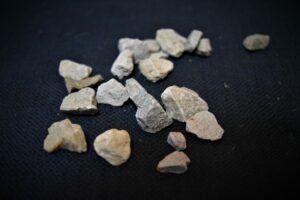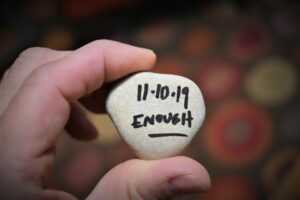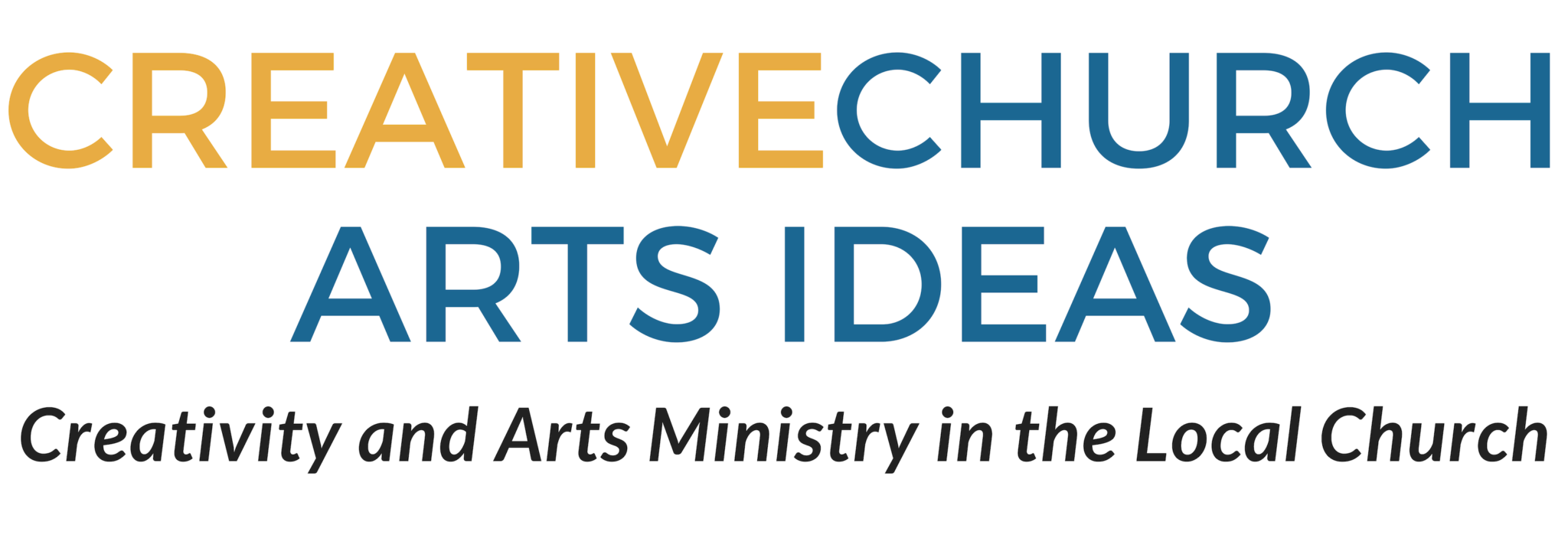Concept:
Use rough and smooth stones to help the congregation mark and remember an important shift in thinking and belief: from lies to truth.
Background:

The Stones: Most Christians are familiar with the Biblical use of stones to commemorate or remember an important event. After God enabled them to cross the Jordan River on dry ground, he instructed the Israelites to build a monument of 12 large stones to remember what he had done for them. (Joshua 4:3-20) Jacob used a stone for a pillow, had a dream from God, then made that stone a “pillar of the Lord’s house”, naming the place Bethel. (Genesis 28) The prophet Samuel memorialized God giving the Hebrews a victory over the Philistines with a monument of stones. (I Samuel 7:12)

Lies and Truth: Belief in a lie will influence the direction of our lives. Adam and Eve’s acceptance of Satan’s lie is the ultimate example. But most of us are susceptible to subtle lies about us, the world, God or others that affect the way we live our lives. If we can identify a lie that we’ve bought in to (for example “I’m just stupid” or “I always mess things up” or “God is mad at me,” etc. ) and counter it with Biblical truth we can become more free to follow and worship God.
(Note: In addition to the “lies and truth” exercise, this practice will work with many other themes that have to do with change, such as letting go of sin, re commitment of lives, initial salvation, etc.)
How it Works:
This practice uses two stones–one rough one and a smooth one–for each member of the congregation. Before the service, a rough stone will be placed under or near each chair, and many smooth stones will be placed on or near the stage, preferably on tables. A metal bucket will be placed at center stage.
- The speaker may give a talk about how the subtle lies we believe about ourselves, life, God, and others can affect the course of our lives. Examples from the Bible include Adam and Eve (Genesis 3:4-5), the tower of Babel (Genesis 11), Moses (Exodus 6-7), Judas Iscariot, and many more.
- The speaker may put a list of lies on the screen. See a list of lies below.
- The speaker will ask the congregation to pick up or take the rough stone that is near their chair.
- After the room is settled again. He will invite the congregation to feel the roughness of the stone and to ask God silently if there is a lie that they have been believing. Light music will begin to play. But before releasing them to do this, instruct them with the follow directions:
- Instruct them that when they have that lie in mind, they should pray and give it to God. Then they’ll come up to the front, drop their rough stone in the bucket and say something like, “I release you in the name of Jesus.”
- Then before returning to their seat, they should pick up a smooth stone from one of the tables at the front. (It will be helpful to put directions up

Photo: J Scott McElroy on the screen while these steps are going on.)
- After everyone is seated with their smooth stone, the speaker will invite the congregation to silently ask God what the truth is that counters that lie.
- The speaker may want to put a list of Bible truths on the screens. See a list of Biblical truths below.
- Ushers may pass out sharpies for people to write the truth on their stone and the date, OR you may set up small tables with sharpies on them around the room that people will be invited to go to as the service ends during the last song.
- The speaker ends with a prayer rejecting the lies and sealing the truth in the people hearts and minds. He’ll invite them to carry that stone with them during the week.
- The speaker may also invite them to bring the stone back next Sunday and to share testimonies of what changes have occurred.
- End with a congregational song about freedom and truth.
Result:
This message and practice sticks with people. Many will keep this smooth stone as a remembrance of God’s truth for them for years.

This practice is memorable not only for its interaction with God, the message, scripture, and the stones, but it also a) gives them a solid object they can take with them to aid in receiving the truth fighting the lie, and b) gives the Holy Spirit a unique way to personalize the message for them, and c) gets their senses (touch, sight, sound) and entire body involved.
Details:
- The metal bucket is an important detail, as it adds a audible sound (clink!) to emphasize the finality of letting the lies go.
- If led, you may want to frame giving up the lie as an act of repentance.
- Plan a closing song that adds the message of freedom and truth. This will enhance the feeling of release at the end of the service as people are writing their truth on their stones.
Materials Needed:
- Enough rough stones for the entire congregation. The local hardware store will have bags of these. You can also build anticipation and get families involved by inviting children to ask their parents if they pick them out of their family driveways a couple of weeks in advance of the service. (You’ll need them delivered before that Sunday service.)
- Enough smooth stones for the entire congregation. You can find bags of smooth river stones at hardware stores that have lawn and garden departments (you’ll need to wash them all before use) or have someone gather them from a lakeshore or seashore. Again, plan this well before the day of the service. Each stone should be about the size of a silver dollar and light colored so that they can be written upon.
- You’ll need several boxes of sharpies (about one per every 3 people), and-if you choose not to pass them out–small tables to put them on, so people can come and write their truth on them as the service ends. You may want to have volunteers write the date of the service on one side prior to the service. (That might be helpful but isn’t absolutely necessary.)
- You’ll need a metal bucket to hold all the rough stones when people drop them in.
Tools:
Only a basin to pre-wash the smooth stones if you buy a bag from the hardware store.
For more information on this practice, contact J. Scott McElroy at: Scott (at) TheNewR.org.
Contribute your creative church arts ideas and projects HERE!
If you find this website helpful please consider donating to our ongoing efforts of promoting and resourcing creativity and arts ministry in the local church.
CreativeChurchArtsIdeas.org is the official blog of New Renaissance Arts Movement, a non-profit organization through ACT Intl.
Additional Resources
Lies we may believe:
- I’m not enough.
- I’m not good enough
- I’m too different
- I don’t need anyone else.
- God is mad at me.
- I’m just stupid.
- It’s too late to do the thing he told me to.
- God doesn’t have a plan for me.
- God doesn’t care about me.
- I’m not good at anything.
- No one likes me.
- People will laugh a me.
- I’m not creative
- Nobody would understand my secret.
- I don’t make enough money.
- I’m not pretty enough.
- I can’t be forgiven.
Biblical truth to counter the lies.
I am accepted…
- John 1:12 I am God’s child.
- John 15:15 As a disciple, I am a friend of Jesus Christ.
- Romans 5:1 I have been justified.
- 1 Corinthians 6:17 I am united with the Lord, and I am one with Him in spirit.
- 1 Corinthians 12:27 I am a member of Christ’s body.
- Ephesians 1:3-8 I have been chosen by God and adopted as His child.
- Colossians 1:13-14 I have been redeemed and forgiven of all my sins.
- Colossians 2:9-10 I am complete in Christ.
- Hebrews 4:14-16 I have direct access to the throne of grace through Jesus Christ.
I am secure…
- Romans 8:1-2 I am free from condemnation.
- Romans 8:28 I am assured that God works for my good in all circumstances.
- Romans 8:31-39 I am free from any condemnation brought against me and I cannot be separated from the love of God.
- 2 Corinthians 1:21-22 I have been established, anointed and sealed by God.
- Colossians 3:1-4 I am hidden with Christ in God.
- Philippians 1:6 I am confident that God will complete the good work He started in me.
- Philippians 3:20 I am a citizen of heaven.
- 2 Timothy 1:7 I have not been given a spirit of fear but of power, love and a sound mind.
- 1 John 5:18 I am born of God and the evil one cannot touch me.
I am significant…
- John 15:5 I am a branch of Jesus Christ, the true vine, and a channel of His life.
- John 15:16 I have been chosen and appointed to bear fruit.
- 1 Corinthians 3:16 I am God’s temple.
- 2 Corinthians 5:17-21 I am a minister of reconciliation for God.
- Ephesians 2:6 I am seated with Jesus Christ in the heavenly realm.
- Ephesians 2:10 I am God’s workmanship.
- Ephesians 3:12 I may approach God with freedom and confidence.
- Philippians 4:13 I can do all things through Christ, who strengthens me



Leave a Reply
You must be logged in to post a comment.